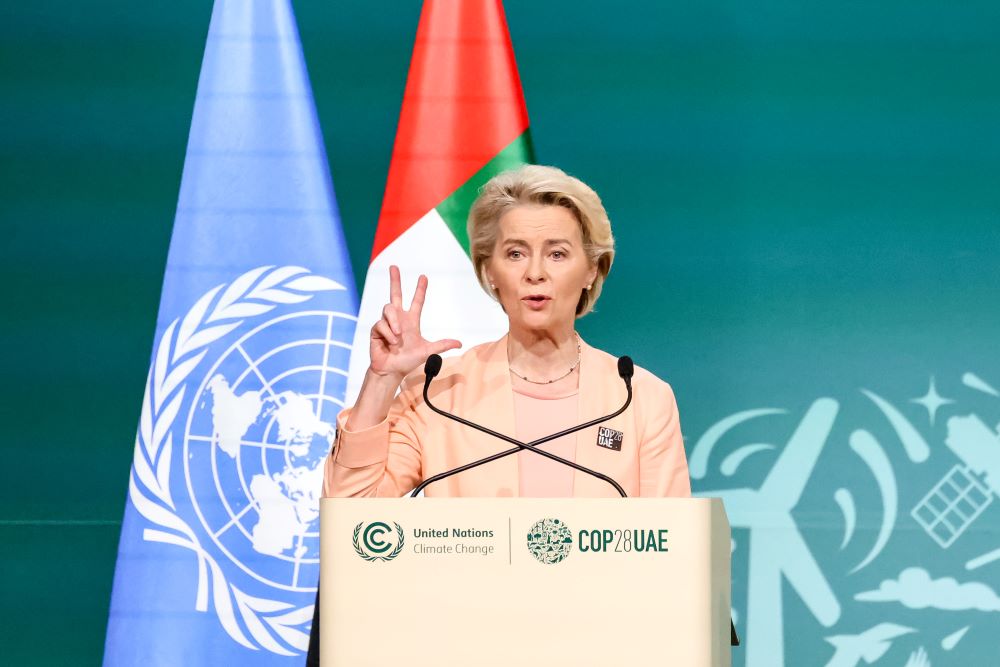Cristina Gamboa is CEO of the World Green Building Council.
Imagine walking through a city where every building is a testament to sustainability, resilience and innovation. A city built by – and now serving – a prosperous, diverse and cohesive society.
This vision of Europe is not a distant dream.
It’s an achievable reality if the European Commission delivers on advancing its sustainable building policy – plans for which should be firmly at the top of President Ursula von der Leyen’s inbox when she returns from summer recess later this month.
In just a few short weeks, her second term will begin in earnest, as will her second push at keeping Europe’s green transition alive – a five-year marathon to cement both her and the bloc’s environmental legacy.
The Commission’s activity to date has been commendable. The revision of the Energy Efficiency Directive (EED) and the Energy Performance of Buildings Directive (EPBD) were key steps towards accelerating climate action in the sector and driving plans under the Renovation Wave to boost energy efficiency in both public and private buildings.
Renewable-energy carbon credits rejected by high-integrity scheme
In the “Political Guidelines released shortly after her re-election, von der Leyen has shown promising signs of continuing to champion sustainable buildings as a climate solution. There is a pledge to create the first EU commissioner with direct responsibility for housing, while our sector awaits with interest the new “Circular Economy Act”, designed to create market demand for reused and recycled materials.
This is promising – but von der Leyen must go further both in implementing existing policies and in developing new ones to maximise the holistic benefits of sustainable buildings for everyone.
We know already that sustainable buildings have huge greenhouse gas reduction potential. Buildings are responsible for about 40% of total energy consumption in the EU and 36% of greenhouse gas emissions from energy, so they can help improve energy security, reducing the bloc’s exposure to geopolitical shocks and reliance on fossil fuels.
Creating jobs, lowering energy costs
What isn’t spoken about enough is that they have the potential to address other issues facing Europe today: the cost of living and the unemployment crises.
For me, these less-discussed issues in the context of buildings are just as, if not more, important due to their co-benefits for people and society.
Take the energy efficient renovation of buildings, for example. The widespread availability of well-insulated buildings that keep out the heat during summer but retain the warmth during winter will significantly cut energy costs across the continent.
The benefits of this will be far-reaching, but particularly for vulnerable or low-income households. Given soaring energy bills, improving energy efficiency across buildings would not only reduce associated costs, but also enhance living conditions.
The benefits of renovating buildings do not stop here.
This task alone could create millions of employment opportunities across Europe: 18 jobs are created for every €1 million invested in this type of renovation.
Bearing in mind figures from the European Commission, which calculated that €275 billion will be needed annually to bridge the building renovation gap in the EU, this level of investment could lead to nearly 5 million extra jobs across the bloc.
Not only that, there is a real financial incentive for national governments to look towards investing in the building sector to save in the long run. Data from the Spanish government showed that while supporting one person through unemployment cost €20,000, funding a new construction role amounted to €14,000, a significant decrease. These statistics show a real-world example of how buildings can both address governmental issues and create better prospects for individuals.
Blueprint ready to go
Europe is at a significant moment in its history.
We are only five years away from 2030, a deadline by which Europe committed to slash half its emissions, determining whether it will be on track to become the first climate-neutral continent. Yet the recent parliamentary elections showed a record number of seats from parties that could make the path to net zero more challenging.
Von der Leyen has a real chance to confirm her legacy of green policies by driving an energy-efficient, regenerative and just transition in the built environment. World Green Building Council’s Europe Regional Network stands ready to continue to build momentum with the Commission over the next five years and create tangible benefits at the individual, societal and national levels.
Let’s create a brighter, equitable and more sustainable future for all of Europe. The blueprint is ready; we just need to turn it into reality.
The World Green Building Council leads BuildingLife, a project that drives the Commission’s EU Green Deal across the bloc by working to eliminate the whole-life carbon impact of buildings.
